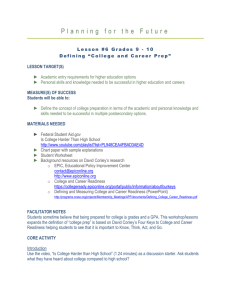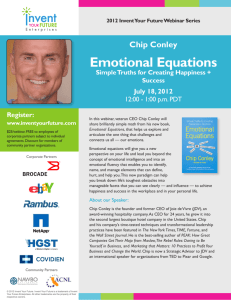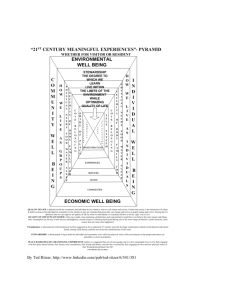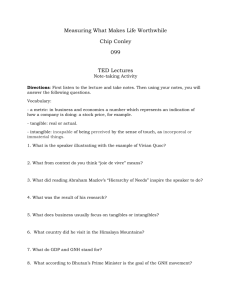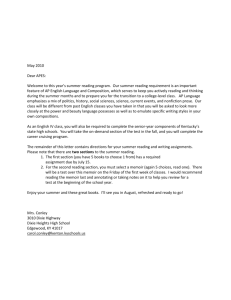CHIP CONLEY
advertisement
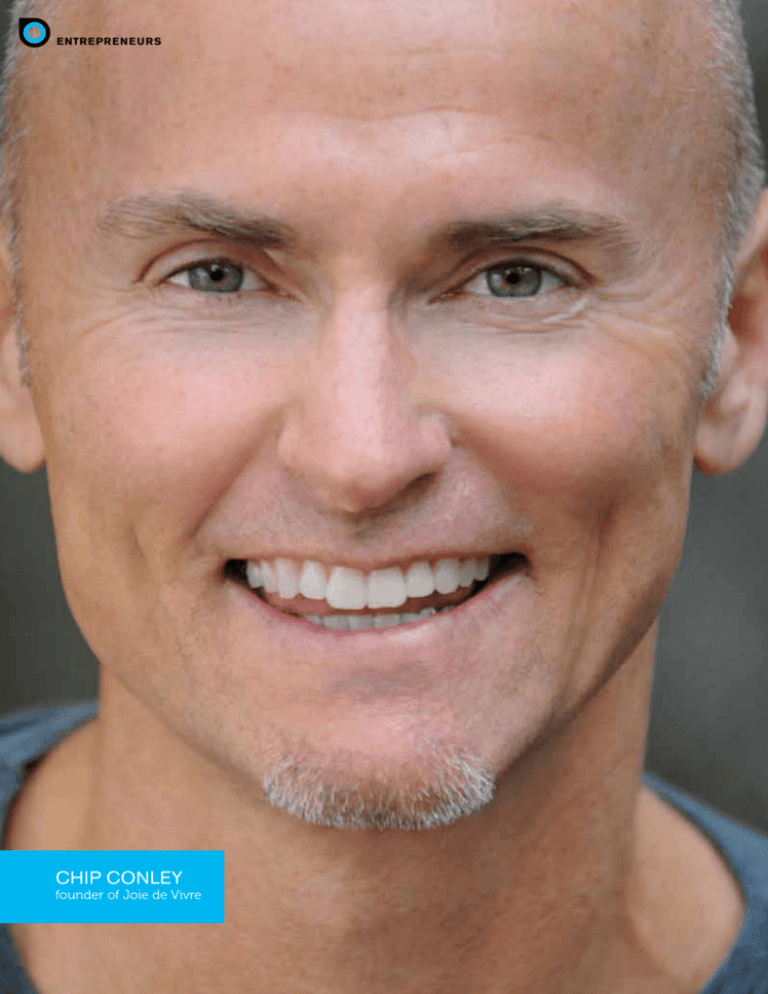
EMPRENDEDORES ENTREPRENEURS CHIP CONLEY founder of Joie de Vivre 2. june-july 2012 The Joy of Living He can boast having done the impossible: come back from the dead. Rebel entrepreneur, founder of the Joie de Vivre hotel chain, author of several best-sellers and a much-admired speaker, Chip Conley’s most critical moment came in 2008. He had just finished giving a speech in St. Louis. He was still on the stage when he suddenly passed out, and his heart stopped. “But like the Phoenix,” he laughs, “I rose from my own ashes.” Conley, who has an outgoing personality, had barely received his MBA from Stanford back in 1987, when he started on the road to building one of the most important hotel chains in the entire United States. The Joie de Vivre Hospitality empire reports annual revenues of US$ 240 million, and is made up of 35 boutique hotels, 20 restaurants and five Spas. Today Conley is considered an exemplary leader, and the creator of an organization that manages to get top performances out of its employees. While he no longer holds the post of CEO, Conley continues to be involved, as strategic consultant for the firm. With his rare combination of emotional sensitivity, business vision, creativity and generosity, he implemented a singular marketing strategy and a people-oriented management style that is much admired in the market and on which he has written several books, for one of which—The Rebel Rules—Virgin Group founder Richard Branson wrote the prolog. But, how did he manage to turn a broken down hotel in San Francisco into one of the most distinguished hotel chains in the USA? How did he bring annual personnel rotation down to 25%—half the industry average? And how did he manage to get through two economic crises that devastated the travel market and come out better positioned than ever? It was practically out of the blue that Chip Conley founded Joie de Vivre one of the most successful hotel chains in the United States. Widely recognized as an exemplary leader, his greatest virtue has been to have suffered successive crises— both economic and personal—only to come through them strengthened. by FRANCISCA POUILLER Each Hotel, Its Own Brand The creator of the multiple awardwinning Joie de Vivre speaks somewhat parsimoniously. He receives us at his home—a refuge that looks like a Buddhist sanctuary, complete with altar and pond. It is a sort of ashram, which obeys to perfection the lines of feng shui architecture. There, he meditates, works and writes. At 51, Conley appears to have found his balance. He affectionately recalls the opening of his first hotel. “I was working wobi.com/magazine 3. ENTREPRENEURS Three views of the Hotel Vitale: terrace, lobby and round room. in a real estate firm,” he says, “but I wasn’t satisfied. I decided to use my knowledge in that field to find something that would challenge me and imply greater creativity. It was then that I bought a broken down hotel in a bad area of San Francisco. I refurbished it and christened it the Phoenix.” The Phoenix emerged from an original proposal, something unheard of up to then in the industry: It was conceived for a niche market, and its style and aesthetics reflected the rock and roll culture. Two decades later, it has become an emblematic hotel that has lodged such music legends as David Bowie, Linda Ronstadt and Nirvana, and is the first in the largest chain of boutique hotels in California and the second-largest in the United States. So, why the name Joie de Vivre? “Because of our mission as a company,” says Conley, “and also because, through our 4. june-july 2012 service, we create experiences that honor the joy of living.” Over the course of time, other hotels joined the Phoenix, each with a different style and a personality of its own: romantic, luxurious, sophisticated... something for every taste. The method employed to design the brand identity of each establishment is a curious one. First the firm seeks a magazine that best represents the experience it wishes to offer its guests. Then, five words are chosen to describe the hotel and its essence. With these premises in place, the development process begins. A couple of examples: The inspiration for the Phoenix came from Rolling Stone, while the Rex emulated the literary and intellectual class of The New Yorker. Applying this simple strategy to each hotel facilitates the process of making thousands of decisions, from which market the hotel will be oriented toward, to what type of services it will offer its customers. Happy Employees Since its founding, Joie de Vivre has been growing strongly and steadily. It was already well positioned in San Francisco when, at the end of the 1990s, the dot com bubble burst. Later, the terrorist attack on the Twin Towers in 2001 and the pandemic SARS scare just afterward dealt the travel industry a severe blow. In short, the chain’s annual revenues dropped from US$ 100 million to US$ 75 million. But the decision of both Conley and the company’s board of directors was that the problem should only affect them: They either cut their own salaries or simply worked without pay, “in my case,” says Conley, “for three years.” The staff highly valued this sacrifice, since despite the crisis, no one was laid off. The Hotel Phoenix, pool and suite. “ The name Joie de Vivre reflects our mission as a company, and we also chose it because, through our service, we create experiences that honor the joy of living. “ Troubled by so many problems, as he was browsing the self-help shelves of the bookstore one day, Conley came across Abraham Maslow’s Toward a Psychology of Being. And it was through the “pyramid of needs”—a model that proposes prioritizing human needs—that the hotel chain owner found the inspiration to write Peak: How Great Companies Get their Mojo from Maslow. Says Conley: “What Maslow says, basically, is that people aspire to ‘self-realization’, and that when they achieve it, they have extreme experiences or peaks. So I got to thinking that if I could generate a work environment in which the staff could live this kind of experiences, I would end up having a very high-performance organization. It has been demonstrated that happy employees generate happier customers, which, in turn, leads to growth and higher profitability for the company.” What kind of experiences can explain the excellent performance levels of those who work for Joie de Vivre? “We offer to let them enjoy the rooms free of charge a couple of nights every three months. It’s a simple thing, but very few hotels do it. We also have the biggest Spa in San Francisco, the Kabuki, and they’re welcome to use it for half price. We also give them a month of paid vacation every three years.” It was thanks to this human resources policy that Joie de Vivre was able to not only recover, but to triple its annual revenues between 2001 and 2008. From CEO to Emotional Chief “We’re living in an age that demands that we not only be executive bosses, but also emotional bosses,” says Conley. And four years ago, after more than two decades at the head of the company, he decided it was time for a change. “I realized that I no longer wanted to be CEO. Two years later, I sold the majority share package of the company and went through a period of transition— from CEO to emotional chief. I still stay in very close contact. I still own part of it, but I’m no longer involved in the day to day.” The Joie de Vivre chain was acquired by Geolo Capital, and in October of 2011, it merged with Thompson Hotels, one of whose founders became CEO of the new company. Be that as it may, the firm’s culture in this new stage is just as vibrant and enthusiastic as the one promoted by its creator. “A company has the culture it deserves,” says Conley. “If the leaders think of their employees as untrustworthy, the employees won’t be trusting either, and this will generate an atmosphere of friction. And at the end of the day, the one who feels this discontent is the customer. My strategy is long term. I call wobi.com/magazine 5. ENTREPRENEURS Emotional Equations In 2008, even as he was giving talks about the importance of self-realization and while he continued to open new hotels, Chip Conley’s discontent was increasing more all the time. A number of personal tragedies plagued him—the end of a long love relationship, his son’s going to prison “for something he didn’t do,” the suicides of five close friends— and these things together with the economic crisis that shook the United States drove him into deep depression. “After twenty years at the helm of the company I’d founded,” Conley recalls. “I felt there was no room for creativity. My duties had become bureaucratic and, besides, I’d had a health problem that almost killed me. It was like divine intervention. A wake-up call telling me I was on Earth to do something more.” At that time of anxiety and desperation, when “everything that could go wrong went wrong,” another “Jewish psychologist” (besides Maslow) offered him the tools he needed to get his head above water again. He found himself reading Man’s Search for Meaning, by Victor Frankl, who, in that book, posits that the best motivator is to find the meaning in things. Based on that idea, Conley worked out an equation that he repeated every day: “Desperation equals suffering minus meaning.” Since suffering, according to Buddhism, is a constant in life, Conley started considering meaning a variable, and concentrated on increasing the meaning in his life as a means of minimizing desperation. “What can I learn from this situation?” he asked himself constantly. Parallel to this, he decided to enter into the study of emotions. He traveled with a United Nations delegation to Bhutan, a small country located between India and China. There, King Jigme Singye Wangchuck, who governed the country it ‘karmic capitalism’, because karma lasts all your life, and I think the same is true of reputation.” Without a doubt, it was worth waiting for the results of that strategy: In 2011, for the sixth consecutive year, the San Francisco Business Times and the Silicon Valley/San José Business Journal distinguished Joie de Vivre as one of the ten best companies to work for in the San Francisco Bay Area. Also in 2011, Market Metrix ranked it number one in customer service, surpassing Marriott, Hilton, Hyatt and Sheraton, among other hotel chains. But Conley isn’t the type of man to rest on his laurels, and he is always making an effort to go beyond his own limits. “The business world has a funda- 6. june-july 2012 from 1972 through 2006, had coined the term “Gross Domestic Happiness”—as opposed to the Gross Domestic Product— used to define the development model for the country, and which was the bottom line for cultural and social awareness, as summarized in three values: happiness, gender equality and preservation of the environment. “I met with the prime minister,” Conley recalls, “and came back with an equation for happiness: Happiness equals wanting what you have, divided by having what you want. In other words, the gratitude you feel for what you have over the search for what you want to have. There’s nothing wrong with setting goals and trying to reach them,” he adds, “as long as we balance that with what we already have, feel thankful for that, and show it.” And so it was that more emotional equations took shape: the anxiety equation, the happiness equation, the regret equation, the curiosity equation. These formulas, which have an academic basis, helped Conley understand and articulate what was happening to him inside, and to focus on the variables he could cope with, instead of continuously struggling with the constants over which he had no control, such as the economic crisis or death. His 2012 book, Emotional Equations, is on the New York Times bestseller list and has numerous followers. Among these is Management Professor Robert Sutton, who says: “I’m not sure I’ve ever seen another book like this in my life. When I started reading it, I couldn’t figure out whether it was a self-help manual or a business manual. By the end, I realized it was both. And in Chip’s case, the key to his success as a leader and mentor is that he has been able to cope with his emotions and channel them properly.” mental role to play in society,” he says. “We’ve been distinguished for our strong policy on respect for the environment and for helping the communities where our hotels are. One of the criteria when it comes to evaluating general managers, for example, isn’t just measuring how much money their hotel operations generated, but also, how much they donated to non-profit organizations.” Beyond the successes he has accumulated and the personal satisfactions he has had, Conley likes to consider himself a rebel. And whenever he feels that his life is getting too dull, he likes to go back to his roots, find something that makes sense, and advance. “All entrepreneurs have to be aware of the vehicle that their company implies for them. A company can be a means of making money, achieving fame or changing the world. My goal was to create opportunities to celebrate life, bearing in mind both customers and employees.” Mission accomplished. z © WOBI Francisca Pouiller forms part of the WOBI Multimedia Contents production team.

